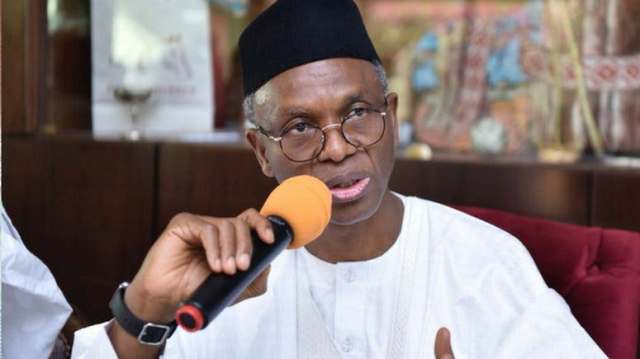Softly, softly, Governor El-Rufai
In the face of dwindling revenues from the Federation Account Allocations Committee (FAAC) Governor Nasir El-Rufai of Kaduna State, recently stated that his government was elected to develop the state and not just to pay salaries. This comes after the disengagement of about 4,000 workers across the 23 local government areas of the state. Governor […]

Governor Nasir El-Rufai
In the face of dwindling revenues from the Federation Account Allocations Committee (FAAC) Governor Nasir El-Rufai of Kaduna State, recently stated that his government was elected to develop the state and not just to pay salaries. This comes after the disengagement of about 4,000 workers across the 23 local government areas of the state.
Governor El-Rufai made the remark in justification of the need to downsize the state’s bloated workforce and the huge personnel cost incurred in paying salaries and emoluments as a result.
- Terrorism financing: Dozens arrested in nationwide crackdown
- 35 million Nigerians may abuse drugs by 2050 — Marwa
In a statement signed on his behalf by his Special Adviser on Media and Communication, Muyiwa Adekeye, the governor said the state’s public finances have been severely stretched by high wage bills at a time when revenues from the Federation Account Allocations Committee (FAAC) have not increased.
According to Governor El-Rufai, “In the last six months, personnel costs have accounted for between 84.97% and 96.63% of FAAC transfers received by the Kaduna State Government’’. Continuing, Governor El-Rufai said that “In November 2020, the state had only N162.9 million left in its account after paying salaries from the N4.83bn received from FAAC and paying N4.66bn as wages.’’
He described the job cut as “A painful but necessary step to take for the sake of the majority of the people of this state. The public service of the state with less than 100,000 employees (and their families) cannot be consuming more than 90% of government resources with little left to positively impact the lives of more than nine million that are not political appointees or civil servants.’’
There is no gainsaying that indeed Kaduna State like virtually all the other states in the country is grappling with acute shortfalls from FAAC. This development is attributed majorly to the falling price of crude oil in the global oil market as a consequence of the Covid-19 pandemic. Crude oil revenues which form the bulk of Nigeria’s revenue have taken a hit as a result.
State governments across the country are increasingly finding it difficult to meet up with basic responsibilities among which, is the payment of salaries to public service workers.
Against this background, it is understandable that the governor would take action to cope with falling revenues. However, the government must examine all the options available to it in order to deliver on the core mandates for which it was elected. As stated by the governor, the government “was elected to promote equality of opportunity, to build and run schools and hospitals, upgrade infrastructure and make the state more secure and attractive to the private sector for jobs and investments.’’
We believe that in introducing these painful but necessary measures, the state government owes it a duty to be considerate in implementation. There is every need for dialogue with representatives of the workers, who after all have rights under extant constitutional and labour laws of the country. A decision that affects their welfare and future should not be subject to arbitrariness.
Governor El-Rufai should also consider and emulate some of the steps taken by other state governments in coping with the challenges facing them in this regard. Some like Kano, for instance, have opted to reduce the salaries of political appointees and public workers across the board. Kaduna State government could also embark on retraining in new skills for those to be disengaged in order to provide them with new opportunities that will enable them fit into the vision that the governor has for the state.
It is important to state here that the rate of unemployment in the country is already high and its attendant effects are being felt daily.
Already, Kaduna State is battling serious security issues, there is the danger of making the situation worse if considerable care is not taken by the government in handling this very sensitive matter.
